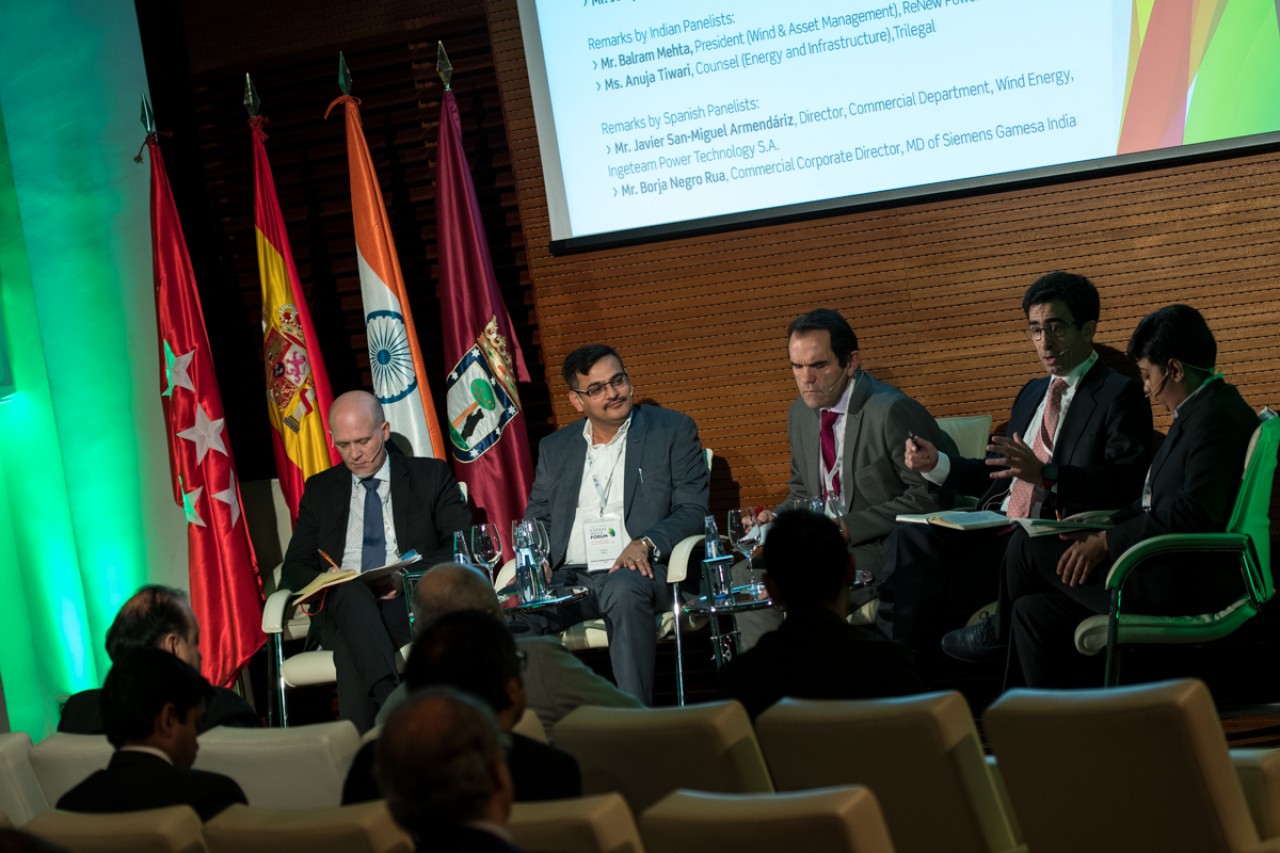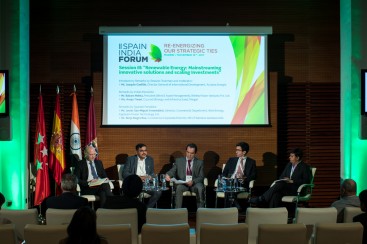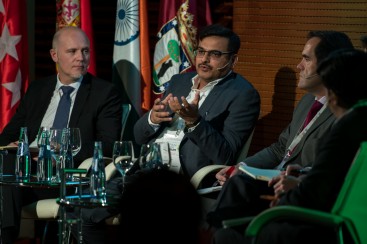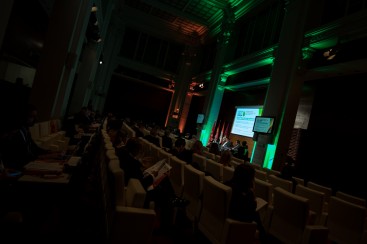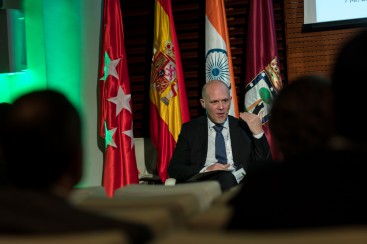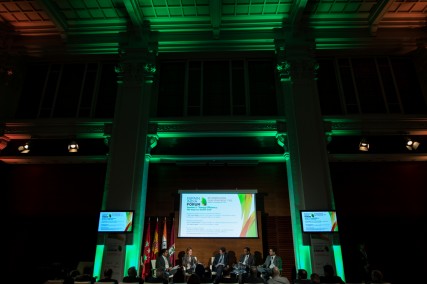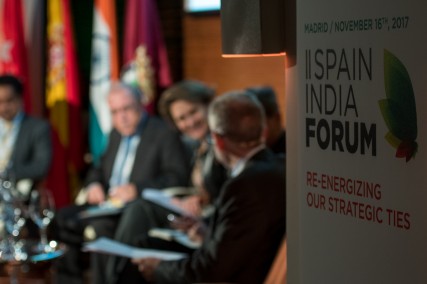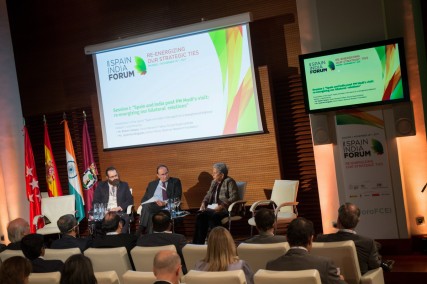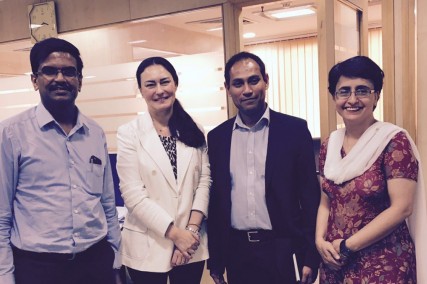India's energy market is undergoing a period of transition, giving rise to a competitive scenario packed with challenges, risks and opportunities. The panellists taking part in the Forum's third session analysed the current state of affairs in the sector and gave their opinion on the direction it will take in the coming years.
The panel was moderated by Joaquín Castillo, Senior VP of Global Business Development at Acciona Energía, and featured Balram Mehta, President of ReNew Power Ventures, Anuja Tiwari, a lawyer at the law firm Trilegal, Javier San-Miguel Armendáriz, Director of Ingeteam Power Technology's Commercial Department and Borja Negro Rua, Sales and Marketing Managing Director at Siemens Gamesa India.
In India, the energy sector is currently “reconsidering its way of doing business,” said Javier San-Miguel. According to the Ingeteam executive, “a great opportunity has been created which will allow everybody to position themselves” thanks to the policies of India's Government and its unrelenting support for renewable energies.
For Anuja Tiwari, “the Government is doing a lot to help new energy technologies to become as widespread as possible. From a legal standpoint, the current framework is a help rather than a hindrance”.
Government regulations include, according to Tiwari, “policies related to future technologies such as repowering (the replacement of old stations by more modern, efficient ones), off-shore generation and the transition to electric mobility”.
However, so far the most significant initiative is the auction system, which according to Balram Mehta, is “very well thought out”; despite the system having suffered certain imbalances in the past few months, Mr Mehta added that “my experience tells me a viable rate will be found in the end”.
Borja Negro shared this opinion. The Sales and Marketing Managing Director at Siemens Gamesa India stated that “India's Government has done well to support a competitive pricing model, but for the time being we have to deal with some demanding challenges.” In his opinion, it is necessary to “keep insisting on state auctions so that we can plan ahead. The current PPA regulation should not be amended”.
Anuja Tiwari says the development of the PPA model in India “is attractive”: it helps reduce energy costs and prioritises renewable energy over conventional sources.
One of the main challenges the energy sector faces in India is the rise in demand. The country is not 100% electrified, and electrified areas do not receive constant supply. Supply for100% of the population and the rise in electric vehicles will drive up demand and could give rise to some problems. However, Balram Mehta claims “this bottleneck will be temporary”. An added problem, Joaquín Castillo warned, is that the increase in electric vehicles “is not necessarily better for the environment unless the energy mix includes renewables”.
To tackle this issue, Borja Negro proposes hybrid solutions: combining complementary wind and solar power generation. Javier San-Miguel also showed his interest in hybrid and microgrid projects: “hybrid projects allow for a greater energy balance using the same structure. Together with storage systems, they are useful for microgrid systems and will contribute to reducing the use of diesel”.
With regard to microgrids, Anuja Tiwari believes “the Government has done a good job. People need to familiarise themselves with the regulations and learn how to maximise business potential and profits”.
The conclusion of the debate was that, despite current complications, the outlook for India is optimistic, especially taking into account that, as stated by Borja Negro, “India will be able to benefit from the lessons learned in other countries, where the initial investment was extremely high. This investment has now been reduced to a quarter, and India can leverage that”.
The Indian representatives also shared a desire for Spanish companies to participate in the development of the sector in India. Balram Mehta guaranteed that “cooperation with the Spanish industry is possible in India (…) Wind and solar power offer many opportunities”. In turn, Anuja Tiwari referred to the new legal situation and the ease of doing business: “Things have changed a lot since Spanish companies first tried to enter the Indian market. Come over and let's do business”.
The moderator, Joaquín Castillo, wrapped up with a positive outlook for India, a market in which Acciona has been operating for over a decade. “There are some challenges at present, but those are the same as in any other market. If a market has the key elements for growth, as India does, succeeding is only a matter of perseverance”.
Gallery
Excutive Summary
Dossier II Spain India Forum
Agenda II Spain India Forum
Press release II Spain India Forum
Personal Profiles
II Spain-India Forum introductory video
Video: Spain, world leader in renewable energy
